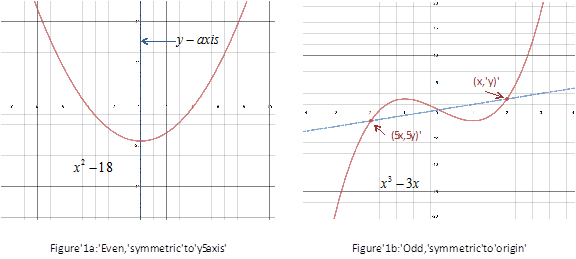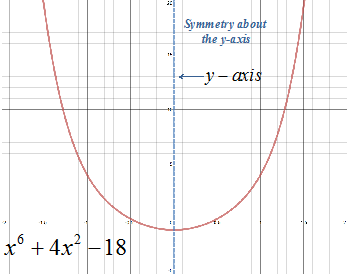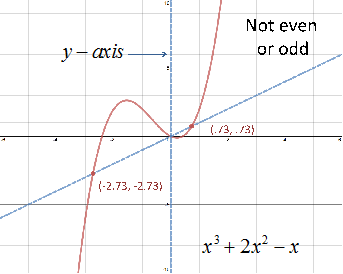Even and Odd Functions
Look at the graphs of the two functions f(x) = x2 - 18 and g(x) = x3 - 3x. The function f(x) = x2 - 18 is symmetric with respect to the y-axis and is thus an even function. The function g(x) = x3 - 3x is symmetric about the origin and is thus an odd function.

Stated another way, functions are even if changing x to -x does not change The value of the function.
EVEN FUNCTION:
f(x) = x2 - 18f(-x) = (-x)2 - 18 = x2 - 18
Since f(-x) = f(x) the function is even.
Functions are odd if changing x to -x negates the value of the function.
ODD FUNCTION:
f(x) = x3 - 3xf(-x) = (-x)3 - 3(-x) = -x3 + 3x = -(x3 - 3x)
Since f(-x) = -f(x) the function is odd.
A function can be even, odd or neither even nor odd. To determine if a function has even or odd symmetry use the following guidelines.
GUIDELINES TO DETERMINE EVEN OR ODD SYMMETRY
2. Compare the results of step 1 to f(x) and -f(x).
3. Determine if the function is even, odd or neither
b. If f(-x) results in the same value as -f(x), the function is odd.
c. If f(-x) did not result in step a or b, the function is neither even nor odd.
Let's look at a couple examples.
|
Step 1: Replace f(x) with f(-x) and simplify the function. |
Original function: f(x) = x6 + 4x2 - 1 Substitute x with -x: f(-x) = (-x)6 + 4(-x)2 - 1 Simplify: f(-x) = x6 + 4x2 - 1 |
|
Step 2: Compare f(-x) to f(x) and -f(x). |
f(-x) = x6 + 4x2 - 1 f(x) = x6 + 4x2 - 1 Compare f(-x) to f(x):
Since f(-x) to f(x) there is no need to compare f(-x) to -f(x) because the function cannot be both. |
|
Step 3: Determine if the function is even, odd, or neither. |
Since f(-x) = f(x) the function is even and has symmetry about the y-axis. |
|
Step 4: Graph the function
|
|
|
Step 1: Replace f(x) with f(-x) and simplify the function. |
Original function: f(x) = x3 + 2x2 - x Substitute x with -x: f(-x) = (-x)3 + 2(-x)2 - (-x) Simplify: f(-x) = -x3 + 2x2 + x |
|
Step 2: Compare f(-x) to f(x) and -f(x). |
f(-x) = -(x3 - 2x2 - x) f(x) = x3 + 2x2 - x -f(x) = -(x3 + 2x2 - x) Compare f(-x) to f(x):
Compare f(-x) to -f(x):
|
|
Step 3: Determine if the function is even, odd, or neither. |
Since f(-x) does not equal f(x) or -f(x) the function is neither even nor odd. |
|
Step 4: Graph the function
|
|
|
Related Links: Math algebra Function Transformations Rolle's Theorem Calculus Topics |
To link to this Even and Odd Functions page, copy the following code to your site:


